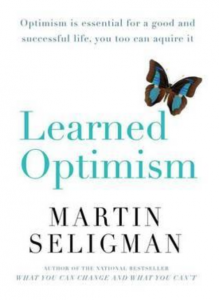
Episode Summary
I’ve now been diving deeper into Martin Seligman’s brilliant book – Learned Optimism. In this episode I share a quick summary of what I’ve discovered about myself and about the challenges I am facing. It’s a perfect blend of hope and help (and who knows, maybe some happiness).
Episode Show Notes
00:05 – I have got back into the book “Learned Optimism” by Martin Seligman.

00:13 – Yesterday I talked about the results of the questionnaire I did that identified I am an “average” optimist.
01:07 – The two types of explanatory style.
01:53 – According to Seligman, the pessimistic explanatory style is the cause of depressed thinking.
02:24 – The three domains of explanatory style are permanence, pervasiveness and personalisation.
03:33 – Here is a quote direct from the book:
My guess is that most depression starts with problems with living and with specific ways of thinking about those problems.
Martin Seligman, Learned Optimism
04:15 – Learned helplessness can be cured by showing someone that their actions will actually work.
04:51 – The small action that got me started on the road to recovery.
05:46 – Changing habits of thinking is a cure for depression. This is how cognitive therapy was developed (and has been proven to work).
06:10 – Rumination is an obsessive contemplation.
06:47 – Seligman believes rumination is the reason twice as many women suffer from depression as men.
07:22 – Rumination, coupled with a pessimistic explanatory style is the recipe for depression.
07:50 – Seligman’s description of the pessimism- rumination chain and how it leads to depression:
First there is some threat against which you believe you are helpless.
Second, you look for the threat’s cause and if you’re a pessimist the cause you arrive at is permanent, pervasive and personal .
Consequently you expect to be helpless in the future and in many situations a conscious expectation that is the last link in the chain, the one triggering depression.
The expectation of helplessness may arise only rarely or it may arise all the time. The more you are inclined to ruminate, the more it arises, the more it arises, the more depressed you will be.
Brooding, thinking about bad things about how bad things are, starts the sequence. Rumination gets the chain going all the time. Any reminder of the original threat causes them to run off the whole pessimism-rumination chain, right through to the expectation of failure and into depression
Martin Seligman, Learned Optimism
09:24 – At last it feels like my condition is understood.
10:15 – The five stages of cognitive therapy:
- Become aware of the automatic thoughts when you feel at your worst.
- Dispute those thought by marshalling contrary evidence.
- Make different explanations using reattribution.
- Distract yourself from depressing thoughts.
- Recognise and question the depression sewing assumptions you have.